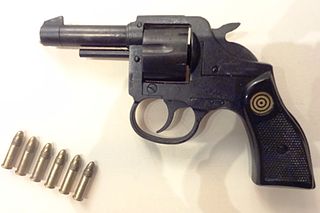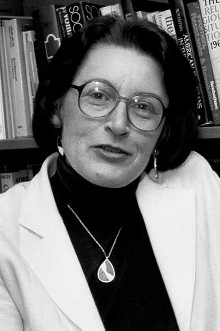Related Research Articles
Gary Kleck is a criminologist and the David J. Bordua Professor Emeritus of Criminology at Florida State University.

Saturday night special is a colloquial term in the United States and Canada for inexpensive, compact, small-caliber handguns made of poor quality metal. Sometimes known as junk guns, some states define these guns by means of composition or material strength. In the late 19th century and early 20th century, they were commonly referred to as suicide specials.
David G. Bromley is a professor of sociology at Virginia Commonwealth University, Richmond, VA and the University of Virginia, Charlottesville, VA, specialized in sociology of religion and the academic study of new religious movements. He has written extensively about cults, new religious movements, apostasy, and the anti-cult movement.
.38 caliber is a frequently used name for the caliber of firearms and firearm cartridges.
Jeffrey Roger Goodwin is a professor of sociology at New York University.

Joe Richard Feagin is an American sociologist and social theorist who has conducted extensive research on racial and gender issues in the United States. He is currently the Ella C. McFadden Distinguished Professor at Texas A&M University.
Jim Rossi is the Judge D.L. Lansden Chair in Law at Vanderbilt University Law School, where he specializes in Energy Law and Administrative Law. His books include Regulatory Bargaining and Public Law, New Frontiers of State Constitutional Law: Dual Enforcement of Norms and Energy, Economics and the Environment.
James T. Richardson is Emeritus Foundation Professor of Sociology and Judicial Studies at the University of Nevada, Reno. He is a sociologist with legal training, who has edited and co-edited over a dozen books and has authored more than 300 scholarly journal articles and book chapters. Areas in which he is specialized include the sociology of religion, the sociology of law, religion and human rights, social control of religions, social psychology of law, social and behavioral science evidence, and treatment of Muslims in courts. Richardson has been an outstanding figure in American sociology of religion for decades, and is considered to be one of the most prominent figures in the field of law and religion in the World. He is also a known scientific critic of brainwashing theories.
Thomas J. Scheff is an American Professor, Emeritus, Department of Sociology at University of California, Santa Barbara. His fields of study are the emotional/relational world, mental illness, restorative justice, and collective violence. He holds a BS from the University of Arizona in Physics (1950), and a PhD in sociology from the University of California (Berkeley) (1960). He was at University of Wisconsin from 1959–63, when he joined the faculty at the University of California, Santa Barbara.

Alice Emma Rossi was a pioneering American feminist and sociologist.
David L. Altheide is an American sociologist. He taught for thirty-seven years at Arizona State University and is Regents' Professor Emeritus of the School of Justice and Social Inquiry there.

James S. Burk is an American sociologist and professor at Texas A&M University. He is most notable as a scholar of military sociology, political sociology, and the history of sociology. He is a central figure in the study of civil-military relations in democratic societies.
David John Doukas, is an American family physician and bioethicist. He holds the James A. Knight Chair of Humanities and Ethics in Medicine, and directs the Program in Medical Ethics and Human Values at Tulane University's School of Medicine. Prof. Doukas is also the Executive Director of the Master of Science in Bioethics and Medical Humanities at Tulane University. Additionally, Dr. Doukas serves as the Health Care Chief Ethics Consultant at the Southeast Louisiana Veterans Health Care System in New Orleans as well as the VISN16 Clinical Ethics Liaison. Professor Doukas was Founding President of the Academy for Professionalism in Health Care, for which he was awarded the first Presidential Award at the Academy for Professionalism in Health Care Annual Meeting in June 2023, for his efforts as Founder and President of APHC for seven years (2012–2019). In a 2023 analysis of the top 100 cited articles in ethics education, Prof. Doukas was "recognized as one of the most influential authors in the field of ethics education, with five articles in the top 10 list attributed to his name that have amassed a total of 296 citations."
Peter Anthony James "Tank" Waddington, often credited as P. A. J. Waddington was a British police officer and later an academic at the University of Wolverhampton, in the United Kingdom. He is known for his research and works on policing and social policy; in particular he is credited for inventing the controversial police tactic of kettling.

Peter Henry Rossi was a prominent sociologist best known for his research on the origin of homelessness, and documenting the changing face of American homelessness in the 1980s. Rossi was also known for his work devising ways to evaluate federally funded initiatives in education, health services, crime control, and housing. He influentially applied his sociological expertise to affect related policy-making and funding agencies. At his death, he was the Stuart A. Rice professor emeritus of Sociology and the director emeritus of the Social and Demographic Research Institute (SADRI) at the University of Massachusetts Amherst.
Christopher J. Uggen is a Regents professor and Distinguished McKnight Professor of sociology and law at the University of Minnesota, where he also holds the Martindale Chair in Sociology. Uggen is best known for his work on public criminology, desistance from crime and the life course, crime in the workplace, sexual harassment, and the effects of mass incarceration, including Felon disenfranchisement, reentry, recidivism, and inequality.

Alisse Waterston is an American professor of anthropology at John Jay College of Criminal Justice, City University of New York. Her work focuses on how systemic violence and inequality influence society.
Joel Gordon Best is a professor of sociology and criminal justice at the University of Delaware. He specializes in topics such as social problems and deviance. His current research focuses on awards, prizes, and honors in American culture. He is an author of over ten books and dozens of academic articles.
Point Blank: Guns and Violence in America is a book about gun violence in the United States by Florida State University criminologist Gary Kleck. The book was published by Aldine de Gruyter in 1991, and received the 1993 Michael J. Hindelang Award from the American Society of Criminology.
Richard T. Wright is an American criminologist. He is Board of Regent's Professor of Criminal Justice and Criminology at Georgia State University (GSU) in the Andrew Young School of Policy Studies. He served as Chair of the Department of Criminal Justice and Criminology at GSU from 2014–2018, and was elected a Fellow of the American Society of Criminology in 2009.
References
- ↑ Boedeker, Hal (April 30, 2019). "'Florida State of Mind' author James Wright has died". Orlando Sentinel. Retrieved May 1, 2019.
- 1 2 "James D. Wright CV" (PDF). University of Central Florida website.
- ↑ "2004 Bruce H. Mayhew Jr. Memorial Lecture Series". Department of Sociology. University of South Carolina.
- ↑ "About the Editor-in-Chief". International Encyclopedia of the Social & Behavioral Sciences 2nd Edition. Elsevier.
- ↑ Fulwood, Sam (July 16, 1990). "Poor Feeling the Pinch as Low-Rent Housing Shrinks". Los Angeles Times.
- ↑ Schemo, Diana Jean (November 10, 2001). "In Covenant Marriage, Forging Ties That Bind". New York Times.
- ↑ Galloway, Paul (February 24, 1985). "Bearing Arms: The Rewards, The Risks". Chicago Tribune. p. 2.
- ↑ Kaminer, Wendy (March 1996). "Second Thoughts on the Second Amendment". The Atlantic.
- ↑ Wright, James D. (1994). "Armed and Considered Dangerous". De Gruyter.
- ↑ Zimring, Franklin E. (July 1987). "James D. Wright, Peter H. Rossi". American Journal of Sociology. 93 (1): 224–226. doi:10.1086/228727.
- ↑ Lawlor, John (March 23, 1989). "Gun Control: First We Should Find Out What Will Work". Chicago Tribune.
- ↑ Goldberg, Jeffrey (November 29, 2012). "The Case for More Guns (and More Gun Control)". The Atlantic (published December 2012).
- ↑ Macmillan Publishers. "A Florida State of Mind". Macmillan Publishers. Retrieved March 27, 2019.
- ↑ Wright, James D. (2017). "Curriculum Vitae" (PDF). University of Central Florida Faculty Profile. Retrieved March 27, 2019.